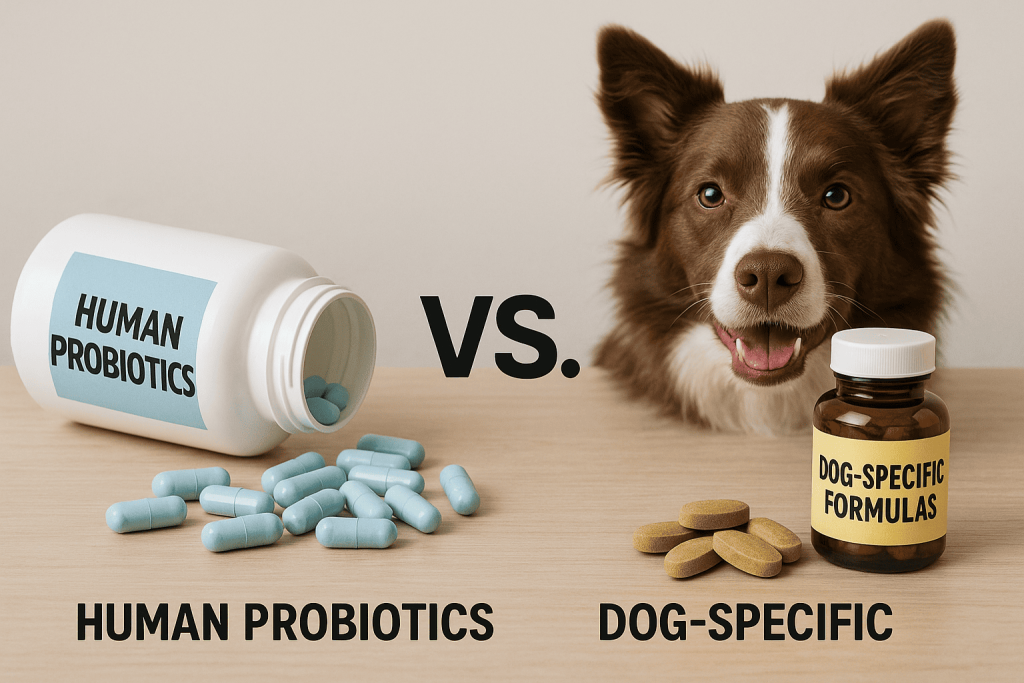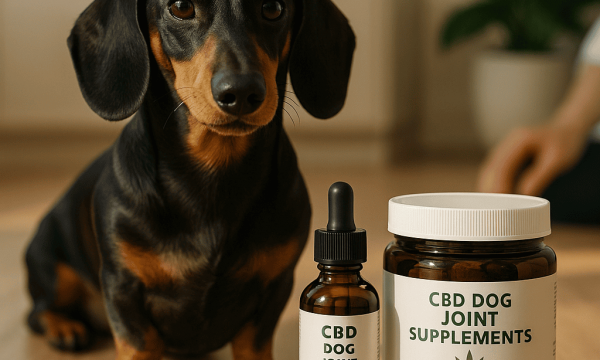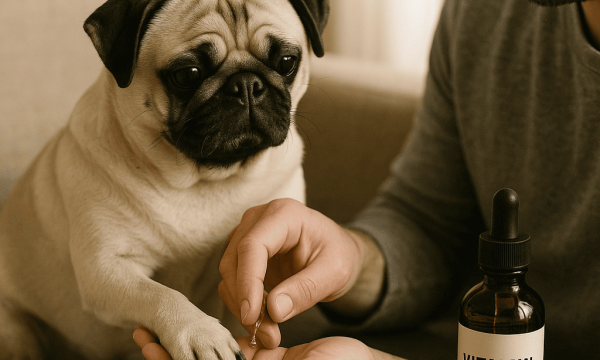As a veterinarian, I am often approached by owners concerned about their pets’ well-being, especially when it comes to digestive health. One of the most frequent questions in 2025 is: Can I give my dog human probiotics? This is not surprising — probiotics for dogs have become a hot topic thanks to the rise in research about the gut microbiome’s influence on overall health, not just for humans but for our four-legged companions as well. Many owners naturally assume that what works for them may help their dogs. However, when it comes to dog probiotics, the situation is more nuanced. Let’s look at what modern veterinary science tells us about dog digestive health and safe choices for supporting your pet’s gut.
Understanding probiotics for dogs
What exactly are probiotics?
Probiotics are live microorganisms — most commonly bacteria — that, when administered in adequate amounts, can confer a health benefit on the host. For dogs, these “good” bacteria are designed to support the canine microbiome, which refers to the vast population of microbes living in the gastrointestinal tract.
The main types of probiotic strains used in dogs include Lactobacillus, Bifidobacterium, and Enterococcus species. These strains are selected not only for their safety but also for their proven ability to colonize the canine gut, outcompete potentially harmful bacteria, and produce metabolites such as short-chain fatty acids that support digestive and immune health.
Probiotic efficacy in dogs depends on several factors:
- Strain specificity: Not all probiotics are the same — even within the same species, different strains may have completely different effects.
- Viability at ingestion: Effective dog probiotics must contain live, viable bacteria in adequate amounts (measured in CFU — colony forming units) at the time they reach your dog’s intestines.
- Delivery method: Probiotics for dogs are often manufactured as chews, powders, or capsules, each with advantages for stability and palatability.
Scientific note:
Numerous studies have shown that certain strains, such as Enterococcus faecium NCIMB 10415 and Bifidobacterium animalis, can help normalize stool consistency and support immune responses in dogs. The choice of strain should always match the intended clinical benefit.
How probiotics support a dog’s microbiome
The canine microbiome is now recognized as a central player in not just digestion, but also immune modulation, resistance to pathogens, nutrient metabolism, and even behavior through the gut-brain axis. A healthy gut microbiome features a balance between beneficial and potentially harmful bacteria. Factors such as antibiotics, stress, abrupt diet changes, and illness can disrupt this balance — leading to symptoms like diarrhea, decreased appetite, or recurrent infections.
Probiotics for dogs may help restore this equilibrium by:
- Replenishing beneficial bacteria after antibiotic use, which can wipe out normal flora.
- Supporting production of short-chain fatty acids that feed gut cells and reduce inflammation.
- Blocking attachment and colonization of pathogenic bacteria.
- Enhancing mucosal immune function, reducing the risk of food allergies and intolerances.
Modern research highlights that the benefits of probiotics are both strain- and dose-dependent. For instance, Lactobacillus rhamnosus GG has demonstrated the ability to reduce duration of some infectious diarrheas in dogs, while Bifidobacterium animalis is linked to improved stool quality and regularity.
Human probiotics vs. dog-specific formulas

Key differences in strains & CFU counts
While the idea of sharing your supplements with your dog is appealing, there are fundamental differences between human probiotics for dogs and professional dog probiotics. The main issues are:
- Microbial composition:
The strains selected for human probiotics are chosen based on human clinical studies and the unique environment of the human gut, which differs in pH, bile acids, and enzymes compared to a dog’s digestive tract. - Dosing:
The effective dose for a human is not necessarily safe or optimal for a dog. Excessive CFU counts can disrupt a dog’s delicate microbiome, while too little offers no benefit. - Formulation and safety:
Additives such as artificial sweeteners (especially xylitol), flavorings, or dairy proteins are common in human supplements but can be harmful to dogs. Only products designed as safe probiotics for dogs undergo appropriate safety testing for pets.
| Feature | Human Probiotics for Dogs | Dog Probiotics |
| Typical Strains | Human strains, e.g., Lactobacillus acidophilus | Canine-targeted, e.g., E. faecium |
| CFU per dose | 1–20 billion (1×10⁹–2×10¹⁰) | 1–5 billion (1×10⁹–5×10⁹) |
| Regulatory oversight | GRAS (human only) | AAFCO/NASC, vet approved probiotics |
| Additives | May include xylitol, lactose | Pet-safe, minimal fillers |
| Clinical evidence | Human studies, not tested in dogs | Backed by veterinary clinical research |
CFU (Colony Forming Units) is the standard measure of probiotic quantity. When choosing probiotics for dogs, always verify the CFU matches your pet’s weight (see table below) and that the product is labeled for pets.
Regulatory note:
AAFCO and NASC set industry standards for safety, quality, and truth-in-labeling for pet supplements. Dog probiotics with these seals have met additional levels of scrutiny and are more likely to deliver reliable benefits.
Are human probiotics safe for dogs?
Some healthy adult dogs may tolerate a short course of human probiotics for dogs, but these products are not designed or tested for dog digestive health. There is no guarantee of efficacy, and the presence of unsafe additives or inappropriate probiotic strains can cause harm.
For long-term use, or for dogs with underlying health concerns, only dog probiotics formulated for pets and meeting AAFCO/NASC standards are considered safe probiotics for dogs.
In summary:
- Occasional, single doses of plain human probiotics may be low risk, but not advisable for routine supplementation.
- Chronic use, or use in puppies, seniors, or dogs with chronic illness, should be strictly avoided unless under direct veterinary supervision.
Benefits & potential risks

Digestive, Immune and Skin benefits
Dog probiotics offer a range of potential benefits supported by both clinical studies and practice guidelines:
- Digestive health:
Probiotics for dogs may help normalize stool quality, reduce frequency of diarrhea, and lessen symptoms during stressful events or after dietary changes. - Immune system support:
Certain probiotic strains can modulate the immune system, reducing inappropriate inflammation and supporting vaccine responses. In some studies, Enterococcus faecium reduced the incidence of atopic dermatitis flares. - Gut barrier function:
A well-balanced canine microbiome helps protect against pathogens and environmental toxins. - Nutrient metabolism:
Probiotics aid in the digestion and absorption of nutrients, and some can synthesize vitamins, such as biotin and certain B vitamins. - Skin and coat health:
Improving gut health with safe probiotics for dogs can have a positive effect on the skin and reduce itchiness caused by mild allergies.
These benefits are more likely to be seen when using vet approved probiotics that match the clinical situation of your dog, rather than generic products or human supplements.
Side effects & When to avoid probiotics
Most dogs tolerate probiotics well, but some may experience temporary changes such as gas, soft stool, or mild abdominal discomfort. These effects typically resolve within a few days as the microbiome adjusts.
Rare but serious side effects can occur if the dog is immunocompromised (e.g., undergoing chemotherapy, on immunosuppressive drugs, or has immune-mediated diseases). In these cases, consult your veterinarian before starting any supplement.
Avoid probiotics if:
- Your dog has a history of severe allergic reactions to supplements.
- The label does not clearly state strains, CFU, and pet safety certifications.
- Your pet has complex, chronic gastrointestinal disease without veterinary oversight.
For the average healthy dog, introducing dog probiotics gradually and monitoring for any changes is a best practice.
Choosing the right product
Vet-Approved strains to look for
To select the best probiotics for dogs, review the following criteria:
- Specific, research-backed strains:
Choose products with strain-level labeling (e.g., Bifidobacterium animalis AHC7, Enterococcus faecium NCIMB 10415). These strains have been studied for their effects in canine digestive health. - Appropriate CFU count:
For most dogs, a daily dose of 1–5 billion CFU is effective. Very small dogs may need less, while larger breeds or those with ongoing GI issues may benefit from the higher end of the range. - Shelf-stable and viable at expiry:
Look for labels that guarantee CFU “at expiry,” not just “at manufacture.” Some vet approved probiotics also feature special coatings or packaging to ensure stability. - Clear AAFCO/NASC certification:
These seals signal that the product has undergone quality checks for ingredient integrity, label accuracy, and safety.
Vet approved probiotics also display AAFCO or NASC certification, which confirms that the formula has been independently evaluated for safety and quality.
Owner insight:
Many clients ask why their dog won’t eat some probiotics. The answer often lies in added flavors or fillers. A well-formulated, palatable supplement with clear, research-backed strains is more likely to be accepted by picky dogs.
Reading labels: CFU, expiry, additives
Understanding the supplement label is crucial for ensuring you’re choosing safe probiotics for dogs:
- CFU (Colony Forming Units):
Always relate the listed CFU to your dog’s body weight (see table). Products that do not specify CFU or strains should be avoided. - Expiry date:
Potency can decline over time, especially if exposed to heat or moisture. Select only dog probiotics that guarantee the listed CFU at the end of shelf life. - Additives and flavorings:
Avoid human probiotics for dogs that contain xylitol, sorbitol, excessive sugars, or artificial colors — these can be harmful to pets.
If you are unsure about a product, consult your veterinarian for advice, or look for recommendations on vet approved probiotics from reputable veterinary organizations.
How to give probiotics to your dog

Dosage by weight table
| Dog Weight | Daily Dosage (CFU) |
| < 10 lbs (4.5 kg) | 0.5–1 billion (0.5×10⁹–1×10⁹) |
| 10–30 lbs (4.5–13.6 kg) | 1–2 billion (1×10⁹–2×10⁹) |
| 30–60 lbs (13.6–27.2 kg) | 2–4 billion (2×10⁹–4×10⁹) |
| > 60 lbs (27.2 kg) | 4–5 billion (4×10⁹–5×10⁹) |
Always check with your veterinarian, especially when introducing a new supplement or changing brands. Dogs with special dietary needs or chronic GI issues may require adjusted dosing.
If you’re wondering about the best duration and schedule for giving your pet these supplements, check out our in-depth guide: How long should a dog be on probiotics? You’ll find practical tips and expert advice tailored to your dog’s unique needs.
Mixing with food vs. capsules
- Powders and granules: Easily mixed into wet or dry food, offering flexibility in administration.
- Capsules: May be given directly, or opened and the contents mixed with food for dogs who resist pills.
- Chews and treats: Convenient and palatable, but always confirm that they are free from unnecessary fillers and are labeled as vet approved probiotics.
Giving dog probiotics with food (preferably at the main meal) can enhance survival of probiotic strains through stomach acid, improving efficacy. For multi-pet households, ensure each dog receives the correct amount based on weight.
FAQs
1. Can I use yogurt as a probiotic for dogs?
While plain yogurt contains live cultures, the CFU count is typically much lower than in dedicated probiotics for dogs. In addition, many dogs are lactose intolerant, so regular yogurt can cause digestive upset. Vet approved probiotics are a more reliable and effective choice for supporting dog gut health.
2. How long should I give my dog probiotics?
Short-term use (1–2 weeks) is appropriate for digestive upsets or following antibiotics. Chronic GI conditions may benefit from longer courses, but always under veterinary guidance. There is no one-size-fits-all duration — monitor your dog’s response and adjust as needed.
3. Are all dog probiotics the same?
No. Dog probiotics differ in their probiotic strains, CFU, manufacturing quality, and certification. Always choose products with AAFCO or NASC seals for best results and safety.
4. Can I give my dog human probiotics?
While the question “can I give my dog human probiotics?” is common, the safest answer is to use dedicated dog probiotics with proven safety and efficacy for pets.
5. Are probiotics safe for puppies and senior dogs?
Generally, yes, if the product is designed for your dog’s age and size. Start with low doses and seek advice from your veterinarian, especially in very young or elderly dogs.
6. Will probiotics help with my dog’s allergies or skin?
Some clinical trials suggest that probiotics for dogs may support skin health and reduce itching by modulating immune responses and supporting a healthy gut-skin axis.
7. Can safe probiotics for dogs be given with antibiotics?
Yes, and this is often recommended. Administer the probiotic at least two hours apart from the antibiotic dose to improve colonization and effectiveness.
Key takeaways & Vet disclaimer
- The answer to “can I give my dog human probiotics?” is: while occasional use may not be harmful, dog probiotics formulated for pets, featuring the correct probiotic strains and proper CFU, are always the safest and most effective choice.
- Look for AAFCO and NASC certifications to ensure safety, and avoid unnecessary fillers or additives.
- Always tailor the choice of supplement and dose to your individual dog’s weight, health status, and specific needs.
- Consult your veterinarian before starting any supplement, particularly if your dog has existing health issues or is taking medication.
This article is provided for informational purposes only and does not substitute for personalized veterinary advice. For further questions about probiotics for dogs or optimizing your dog’s digestive health, consult your vet.




